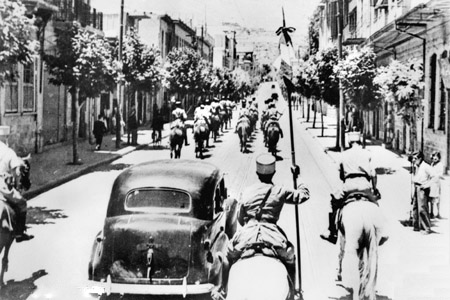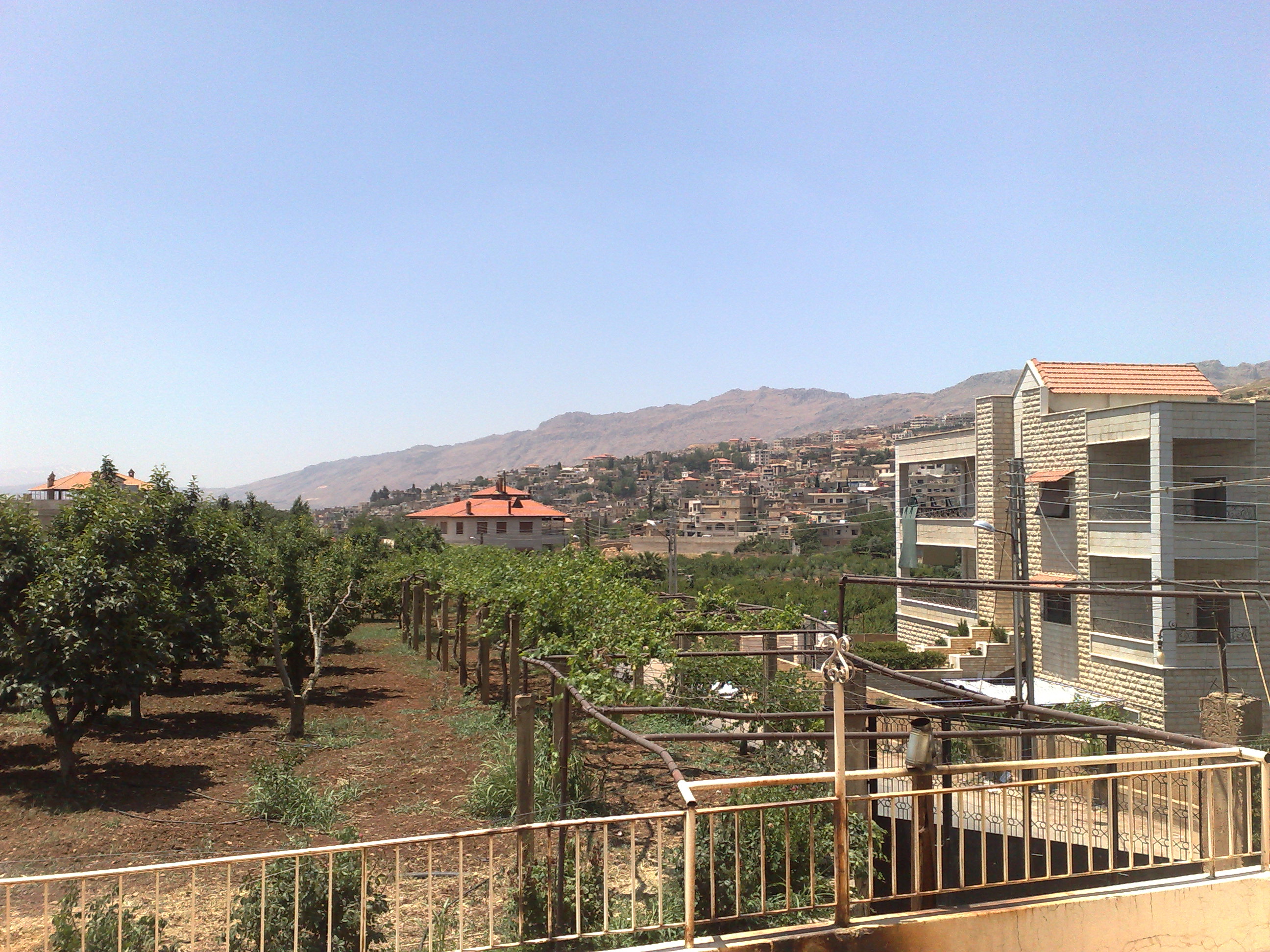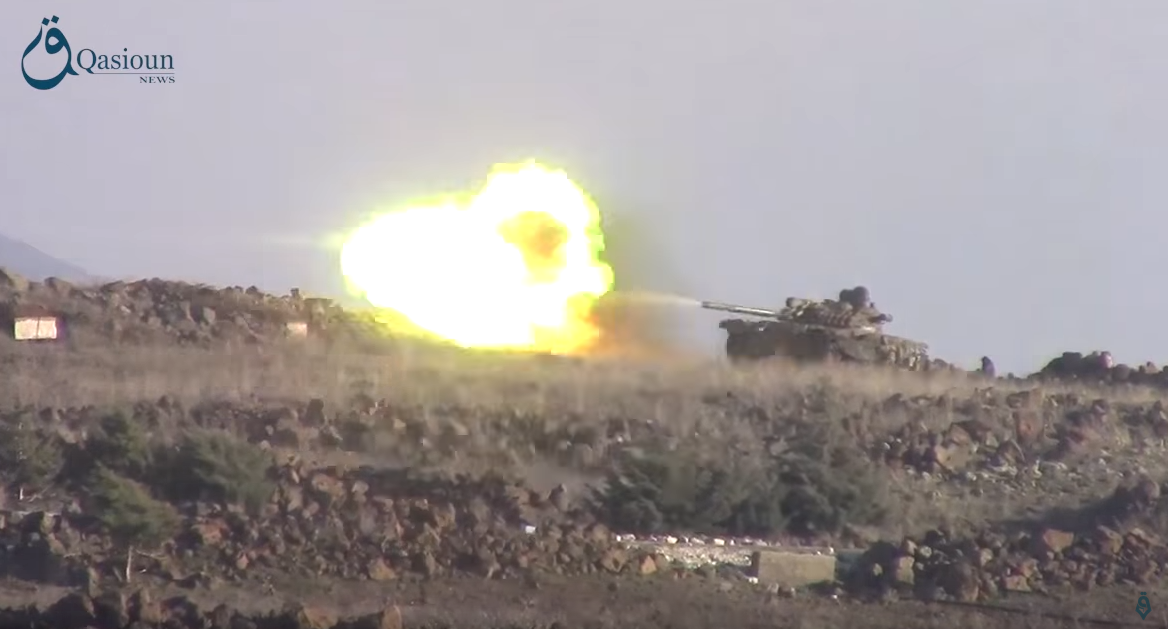|
Beit Jinn Offensive
The Beit Jinn offensive was a military operation by the Syrian Arab Army against opposition groups in the Western Ghouta area, starting on 28 November 2017. Background After successes of the Syrian Army in capturing Khan al-Shih and Wadi Barada valley pockets, and reconciliation agreements in Madaya and Zabadani, Beit Jinn remained the last holdout of opposition forces in Western Ghouta. The area is to the north of a de-escalation zone in southern Syria agreed in July between Russia and the United States. The offensive Capture of Tal Bardiyah On 28 November, government forces claimed to have captured the eastern side of the strategic Bardiyah mountain chain in the besieged Beit Jinn pocket, southwest of Damascus and near the Golan Heights, which is controlled by rebel fighters. Subsequently, there were competing claims between pro-government and pro-opposition sources on whether the rebels recaptured most of the positions they had lost or not. The mountain was fully captu ... [...More Info...] [...Related Items...] OR: [Wikipedia] [Google] [Baidu] |
Rif Dimashq Governorate Campaign
Part of the Syrian Civil War, the Rif Dimashq Governorate campaign consisted of several battles and offensives across the governorate including the Syrian capital of Damascus: Offensives * Rif Dimashq clashes (November 2011–March 2012): Damascus centre under government control, protests largely suppressed in the city. * Battle of Damascus (2012): rebels first infiltration of Damascus from the surrounding countryside. * Rif Dimashq offensive (August–October 2012): Syrian Army seizes more than half a dozen rebel-held towns north, west and south of Damascus, rebels retain control of the Ghouta area, east of Damascus. * Rif Dimashq offensive (November 2012–February 2013): Free Syrian Army takes control of Darayya, Zamalka, Harasta and Arbin, offensive stalls in early January 2013, due to continuing air-strikes. Army launches a major offensive on rebel-held Darayya in mid-January. * Siege of Darayya and Muadamiyat (November 2012–October 2016): rebels surrender Darayya as we ... [...More Info...] [...Related Items...] OR: [Wikipedia] [Google] [Baidu] |
Syrian Army
The Syrian Army is the land force branch of the Syrian Armed Forces. Up until the fall of the Assad regime, the Syrian Arab Army existed as a land force branch of the Syrian Arab Armed Forces, which dominanted the military service of the four uniformed services, controlling the most senior posts in the armed forces, and had the greatest manpower, approximately 80 percent of the combined services.. The Syrian Army originated in local military forces formed by the French after World War I, after France obtained a mandate over the region. It officially came into being in 1945, before Syria obtained full independence the following year and 2 years after official independance. After 1946, it played a major role in Syria's governance, mounting six military coups: two in 1949, including the March 1949 Syrian coup d'état and the August 1949 coup by Colonel Sami al-Hinnawi, and one each in 1951, 1954, 1963, 1966, and 1970. It fought four wars with Israel (1948, the Six-Day War in ... [...More Info...] [...Related Items...] OR: [Wikipedia] [Google] [Baidu] |
The Times Of Israel
''The Times of Israel'' (ToI) is an Israeli multi-language online newspaper that was launched in 2012 and has since become the largest English-language Jewish and Israeli news source by audience size. It was co-founded by Israeli journalist David Horovitz, who is also the founding editor, and American billionaire investor Seth Klarman.Forbes: The World's Billionaires: Seth Klarman . April 2014. Based in , it "documents developments in Israel, the Middle East and around the Jewish world." Along with its original English site, ... [...More Info...] [...Related Items...] OR: [Wikipedia] [Google] [Baidu] |
Zabadani
Al-Zabadani or Az-Zabadani () is a city and popular hill station in southwestern Syria in the Rif Dimashq Governorate, close to the border with Lebanon. It is located in the center of a green valley surrounded by high mountains at an elevation of around 1,100 m. It is located to the right of the international road linking Damascus to Beirut, in the middle of the distance between Damascus and Baalbek, in a mountain valley in the Syrian mountain range, where it rises between 1,150 and 1,250 meters above sea level. Zabadani is located in the semi-arid to semi-humid region, with an average rainfall of 500 mm per year. It is bordered by two mountain ranges, Mount Senir to the west and Jabal Al Shaqif to the east, and in the middle of it is a green carpet that forms the Zabadani Plain. According to the Syria Central Bureau of Statistics (CBS), in the 2004 census Al-Zabadani had a population of 26,285. [...More Info...] [...Related Items...] OR: [Wikipedia] [Google] [Baidu] |
Madaya, Syria
Madaya () is a small mountainous town in Syria, located at an altitude of around . It is located about northwest of Damascus in the Rif Dimashq Governorate. According to the Syria Central Bureau of Statistics (CBS), Madaya had a population of 9,371 in the 2004 census.General Census of Population and Housing 2004 Syria Central Bureau of Statistics (CBS). Rif Dimashq Governorate. Its inhabitants are predominantly s. Madaya is an important summer resort in S ... [...More Info...] [...Related Items...] OR: [Wikipedia] [Google] [Baidu] |
Barada
The Barada ( / ALA-LC: ''Baradā'') is the main river of Damascus, the capital city of Syria. Etymology The word "Barada" is thought to be derived from the word ''barid'', which means "cold" in Semitic languages. The ancient Greek name (), means "streaming with gold". Topography and source Throughout the arid plateau region east of Damascus, oases, streams, and a few minor rivers that empty into swamps and small lakes provide water for local irrigation. Most important of these is the Barada, a river that rises in the Anti-Lebanon Mountains and disappears into the desert. The Barada flows out of the karst spring of Ain al-Fijah, about north west of Damascus in the Anti-Lebanon Mountains, but its true source is Lake Barada, a small lake that is also a karst spring located about from Al-Zabadani. The Barada descends through a steep, narrow gorge named "Rabwe" before it arrives at Damascus, where it divides into seven branches that irrigate the Al Ghutah (الغوطة) oasis, ... [...More Info...] [...Related Items...] OR: [Wikipedia] [Google] [Baidu] |
Khan Al-Shih
Khan al-Shih (; also spelled ''Khan ash-Sheih'', ''Khan Eshieh'' or ''Khan al-Shieh'') is a town in southern Syria, administratively part of the Rif Dimashq Governorate, located southwest of Damascus. It also contains a refugee camp by the same name. Nearby localities include Kafr Hawr to the west, Kanaker to the south, Qatana and Artouz to the north, and Darayya to the northeast. According to the Syria Central Bureau of Statistics, Khan al-Shih had a population of 12,148 in the 2004 census.General Census of Population and Housing 2004 Syria Central Bureau of Statistics (CBS). Rif Dimashq Gov ... [...More Info...] [...Related Items...] OR: [Wikipedia] [Google] [Baidu] |
Syrian Arab Army
The Syrian Arab Armed Forces (SAAF; ) were the combined armed forces of Syria from 1963 to 2024. They served during the rule of the Ba'ath Party in Syria. The SAAF consisted of the Syrian Arab Army, Syrian Arab Air Force, Syrian Arab Air Defense Force, Syrian Arab Navy. According to the 2012 Constitution of Syria, the President of Syria was the Commander-in-chief of the Armed Forces. The Minister of Defence held the position of Deputy Commander-in-chief of the Army and Armed Forces. The SAAF utilized conscription; males served in the military at age 18, but they were exempted from service if they did not have a brother who can take care of their parents. After the beginning of the Syrian Civil War, Syrian military enlisted strength dropped by over half from a pre-civil war figure of 325,000 to 150,000 soldiers in the army in December 2014 due to casualties, desertions and draft dodging, reaching between 178,000 and 220,000 soldiers in the army, in addition to 80,000 t ... [...More Info...] [...Related Items...] OR: [Wikipedia] [Google] [Baidu] |
Umar
Umar ibn al-Khattab (; ), also spelled Omar, was the second Rashidun caliph, ruling from August 634 until his assassination in 644. He succeeded Abu Bakr () and is regarded as a senior companion and father-in-law of the Islamic prophet Muhammad. Initially, Umar opposed Muhammad, who was his distant Qurayshite kinsman. However, after converting to Islam in 616, he became the first Muslim to openly pray at the Kaaba. He participated in nearly all of Muhammad’s battles and expeditions, and Muhammad conferred upon him the title ''al-Fārūq'' ("the Distinguisher") for his sound judgement. After Muhammad’s death in June 632, Umar pledged allegiance to Abu Bakr as the first caliph and served as his chief adviser. In 634, shortly before his death, Abu Bakr nominated Umar as his successor. During Umar’s reign, the caliphate expanded at an unprecedented rate, conquering the Sasanian Empire and more than two-thirds of the Byzantine Empire. His campaigns against the Sasanian ... [...More Info...] [...Related Items...] OR: [Wikipedia] [Google] [Baidu] |
Khan Arnabah
Khan Arnabah also spelt Khan Arnabeh is a town in southwestern Syria, administratively part of the Quneitra Governorate (Golan Heights), in the portion of the province under Israeli control. The town is located just outside the United Nations Disengagement Observer Force Zone. Nearby localities include Sa'sa' to the northeast, Quneitra to the southwest, Jubata al-Khashab to the northwest, as well as the Circassian villages of Beer Ajam and Bariqa to the south. According to the Syria Central Bureau of Statistics, Khan Arnabah had a population of 7,375 at the 2004 census.General Census of Population and Housing 2004 [...More Info...] [...Related Items...] OR: [Wikipedia] [Google] [Baidu] |
Golan Regiment
The Golan Regiment (Arabic: فوج الجولان, Fouj al-Joulan) was a Syrian militia based in Khan Arnabah that was part of the National Defence Forces (Syria), National Defence Forces (NDF). Though primarily active in the Golan Heights, the unit has been deployed in various warzones of western Syria, fighting against many different Syrian opposition forces and the Islamic State of Iraq and the Levant. The Golan Regiment was notable insofar as it was the first Politics of Ba'athist Syria, government unit during the Syrian civil war that was founded by Free Syrian Army (FSA) defectors. History Rebellion and return to the government side The beginnings of the Golan Regiment trace back to 2011, when its later leader Majid Himoud volunteered for the Syrian Army. According to Himoud, the officers in his division abused him and other soldiers, whereupon they decided to defect. In December 2011, they formed a Free Syrian Army unit under Himoud's leadership, the al-Mutasim Batta ... [...More Info...] [...Related Items...] OR: [Wikipedia] [Google] [Baidu] |
Druze
The Druze ( ; , ' or ', , '), who Endonym and exonym, call themselves al-Muwaḥḥidūn (), are an Arabs, Arab Eastern esotericism, esoteric Religious denomination, religious group from West Asia who adhere to the Druze faith, an Abrahamic religions, Abrahamic, Monotheism, monotheistic, and Religious syncretism, syncretic religion whose main tenets assert the unity of God, reincarnation, and the eternity of the soul. Although the Druze faith developed from Isma'ilism, Druze do not identify as Muslims. They maintain Arabic language and Arabic culture, culture as integral parts of their identity, with Arabic being their primary language. Most Druze religious practices are kept secret, and conversion to their religion is not permitted for outsiders. Interfaith marriages are rare and strongly discouraged. They differentiate between spiritual individuals, known as "uqqāl", who hold the faith's secrets, and secular ones, known as "juhhāl", who focus on worldly matters. Druze be ... [...More Info...] [...Related Items...] OR: [Wikipedia] [Google] [Baidu] |




